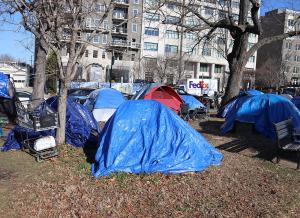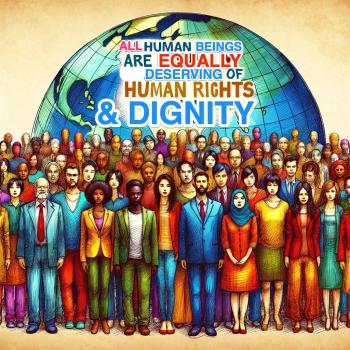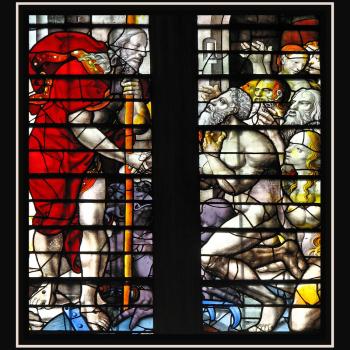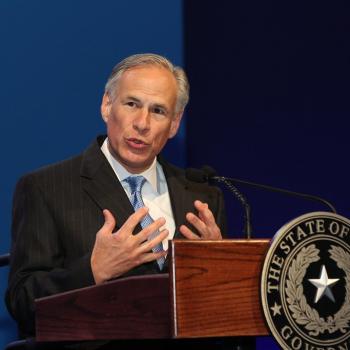
There are many different reasons why someone could be homeless; no matter the reason, every homeless person should be treated with respect and given the help they need to get off the streets. Until such help is given, until they find themselves off the streets, not just with a temporary solution (such as a shelter which allows them to stay for only a few days), but a permanent one, they should not be pushed aside, or worse, fined or treated as a criminal if they are found resting at a public location. Sadly, many who are rich and powerful, many in government, want to kick the homeless while they are down, giving them fines which they cannot afford, and in doing so, making it difficult if not impossible for them to get off the streets (which those who promote such ill-treatment of the homeless say is what they want, that is, the homeless of the streets, which means, their supposed solution is going to do the reverse of what they say they want, though in reality it seems what they really want is to hide the problem from the public by having the homeless somewhere else, instead of really dealing with the problem and fixing it).
Currently, the Supreme Court is dealing with a case which asks if a city which offers no help, no means for the homeless to get off the streets, can fine the homeless, such as those living in camps on public grounds. Can cities, that is, effectively criminalize being homeless? Previously, courts have said that the Eighth Amendment would deny cities and state from having that authority, but now, in the case of City of Grants Pass, Oregon v. Johnson, many are arguing the Eighth Amendment should not apply, and cities should have the right to deal with the homeless as they see fit, as Joel Mathis explains:
Federal courts have previously ruled that the Constitution’s Eighth Amendment, which bars cruel and unusual punishment, “forbids criminalizing sleeping in public” if a person has no other place to lay their head, University of Southern California Law Professor Clare Pastore said at The Conversation. Now the city of Grants Pass, Oregon, is challenging that precedent, arguing the Eighth Amendment “forbids only certain cruel methods of punishment,” not fines or jail terms. The Supreme Court’s decision, Pastore said, will “affect the health and welfare of thousands of people experiencing homelessness.”[1]
Rachel Cohen understands what is coming next, if Grant Pass wins:
Fining, ticketing, or arresting unhoused people — which local governments will be more easily able to do if Grants Pass is overturned — will make it harder for homeless people, who already cannot afford shelter, to obtain permanent housing later on. [2]
As Ann E. Marimow and Reis Thebault observed, it appears that many of the justices are supporting the claims of Grant Pass, saying that cities and states, not judges, should be free to determine how best to deal with the problems of homelessness:
But several conservative justices, who make up a majority of the court, suggested that policymakers, and not judges, should be setting local rules for dealing with homeless people.
Chief Justice John G. Roberts Jr. asked the Biden administration’s lawyer why “these nine people” are the right ones to “weigh the policy judgment.”[3]
What an amazing argument! It would seem as if Roberts and others are saying that a court of law, including the Supreme Court, is not the best place to determine if and when a law is unconstitutional. They are making it so that cities and states can become mini-tyrannies, capable establishing unjust laws which no one has any authority to overturn (so long as those who made such laws remain in power). It is, of course, a cop-out, and the kind which we see happening when the justices agree with what a local government is doing despite what precedent has said about such actions. These are the same justices who have said the question of abortion should be left up to the states but also that states do not have a right to determine if a particular presidential candidate does not meet the qualifications needed to run for office. It is clear there is no consistent legal principle being applied: what they are doing is predetermining the agenda that they want to set, and making up excuses to justify it (even if their excuses contradict what they just said in a recent decision they made).
Morally speaking, we should be taking care of the homeless, not fining them; we should be doing what we can to help them, not shoving them away. Where exactly do we think they will go if every city, every state, shoves them away? What money will they have to get off the streets if they are constantly being fined for living? What kind of country looks to the rich and powerful, especially those who have got rich on the backs of others, and considers their desires above those who are in actual need, those they have used to get rich? It is one which dooms itself, as Scripture said Sodom and Gomorrah did in the past: “ Behold, this was the guilt of your sister Sodom: she and her daughters had pride, surfeit of food, and prosperous ease, but did not aid the poor and needy” (Ezek. 16:49 RSV). It is a country which denies the dignity that is found in every human person, a dignity which can be said to be infinite because every person is made in the image and likeness of God. Undercutting their dignity in this fashion is not just an attack against them, but it is also an attack against the one whose image they represent, that is, God: “He who oppresses a poor man insults his Maker, but he who is kind to the needy honors him” (Prov. 14:31 RSV).
God is found in the poor, in the homeless, and how we treat them is how we treat God. So many who act pious in front of others, who say Lord, Lord, acting like they care about what God wants, are the first to trample upon God when God is found in the poor, and in doing so, risk finding themselves cast away from the God who they degraded (Cf. Matt. 25:39-46). It is not a Christian nation, it is not a Godly nation, which undermines the poor and finds excuse after excuse to hinder their ability to better themselves and get off the streets, excuse after excuse to deny them basic rights; rather, it is an ungodly one, and those who would fine or imprison the homeless and yet claim to be religious must look deep within the eyes of those they would punish and see God looking back at them, pleading them to reconsider and embrace those in need with love, not hate and disgust:
In this world God is cold and hungry in the person of all his poor, for He said: ‘As long as you did it for one of these, the least of my brethren, you did it for me.’ Therefore, God who deigns to give from heaven wants to receive on earth. What kind of creatures are we if we want to take when God gives, but are unwilling to give when He asks it? [4]
We do not know what the Supreme Court will decide, though the arguments being given suggests that the so-called conservatives on the court, those who also consider themselves religious, indeed, Christians, show themselves to be most sympathetic to the city and not to the homeless. They should be careful, and listen to what God has said about that kind of religiosity. God makes it clear, they are not faithful if they would deny the poor, for in such denial of the poor, they deny God as well. “We should understand how those who do not feed the hungry deny food to the one who said that what is given to the poor is bestowed on him.” [5]
What kind of person shows contempt for the poor, promoting and supporting their abuse? Scripture provides its own answer to this question: “ A righteous man knows the rights of the poor; a wicked man does not understand such knowledge” (Prov. 29:7 RSV). If we are concerned about justice, about righteousness in the world, we will be concerned about the poor, like the homeless, making sure they are not mistreated. When a city would like to abuse them, we should do what we can to oppose that city’s policies. If a city would like to deprive the homeless of their legal rights, we should hope the courts will make decisions in their favor. Sadly, with the current Supreme Court, and the way it is casting aside precedents, and the arguments we see coming from its justices, we have every reason to fear wickedness will prevail and the United States will become that much more like Sodom and Gomorrah.
[1] Joel Mathis, “Is The Supreme Court About To Criminalize Homelessness?” in The Week (4-22-2024).
[2] Rachel M. Cohen, “What The Supreme Court Case On Tent Encampments Could Mean For Homeless People” in Vox (4-21-2024).
[3] Ann E. Marimow and Reis Thebault, “Supreme Court Divided Over Homeless Ban And Rights Of The Unhoused” in Washington Post (4-22-2024).
[4] St. Caesarius of Arles, Sermons Volume I (1-80). Trans. Mary Magdeleine Mueller, OSF (New York: Fathers of the Church, 1956), 128 [Sermon 25].
[5] St Leo the Great, Sermons. Trans. Jane Patricia Freeland CSJB and Agnes Josephine Conway SSJ (Washington, DC: CUA Press, 1996), 68 [Sermon 18].
Stay in touch! Like A Little Bit of Nothing on Facebook.
If you liked what you read, please consider sharing it with your friends and family!
N.B.: While I read comments to moderate them, I rarely respond to them. If I don’t respond to your comment directly, don’t assume I am unthankful for it. I appreciate it. But I want readers to feel free to ask questions, and hopefully, dialogue with each other. I have shared what I wanted to say, though some responses will get a brief reply by me, or, if I find it interesting and something I can engage fully, as the foundation for another post. I have had many posts inspired or improved upon thanks to my readers.

















